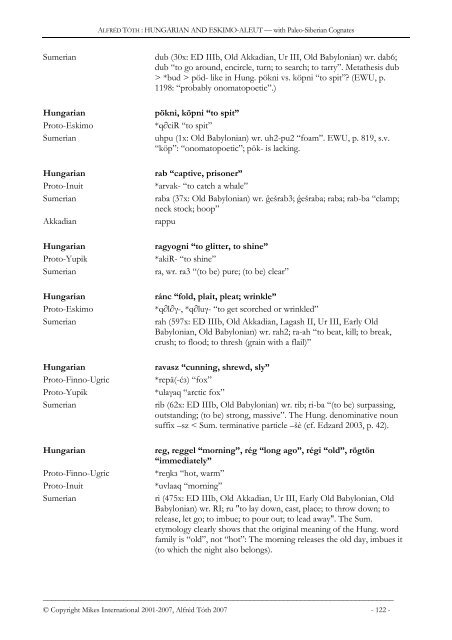Hungarian and Eskimo-Aleut
Hungarian and Eskimo-Aleut
Hungarian and Eskimo-Aleut
Create successful ePaper yourself
Turn your PDF publications into a flip-book with our unique Google optimized e-Paper software.
ALFRÉD TÓTH : HUNGARIAN AND ESKIMO-ALEUT — with Paleo-Siberian Cognates<br />
Sumerian dub (30x: ED IIIb, Old Akkadian, Ur III, Old Babylonian) wr. dab6;<br />
dub “to go around, encircle, turn; to search; to tarry”. Metathesis dub<br />
> *bud > pöd- like in Hung. pökni vs. köpni “to spit”? (EWU, p.<br />
1198: “probably onomatopoetic”.)<br />
<strong>Hungarian</strong> pökni, köpni “to spit”<br />
Proto-<strong>Eskimo</strong> *q∂ciR “to spit”<br />
Sumerian uhpu (1x: Old Babylonian) wr. uh2-pu2 “foam”. EWU, p. 819, s.v.<br />
“köp”: “onomatopoetic”; pök- is lacking.<br />
<strong>Hungarian</strong> rab “captive, prisoner”<br />
Proto-Inuit *arvak- “to catch a whale”<br />
Sumerian raba (37x: Old Babylonian) wr. ĝešrab3; ĝešraba; raba; rab-ba “clamp;<br />
neck stock; hoop”<br />
Akkadian rappu<br />
<strong>Hungarian</strong> ragyogni “to glitter, to shine”<br />
Proto-Yupik *akiR- “to shine”<br />
Sumerian ra, wr. ra3 “(to be) pure; (to be) clear”<br />
<strong>Hungarian</strong> ránc “fold, plait, pleat; wrinkle”<br />
Proto-<strong>Eskimo</strong> *q∂l∂γ-, *q∂luγ- “to get scorched or wrinkled”<br />
Sumerian rah (597x: ED IIIb, Old Akkadian, Lagash II, Ur III, Early Old<br />
Babylonian, Old Babylonian) wr. rah2; ra-ah “to beat, kill; to break,<br />
crush; to flood; to thresh (grain with a flail)”<br />
<strong>Hungarian</strong> ravasz “cunning, shrewd, sly”<br />
Proto-Finno-Ugric *repä(-ćз) “fox”<br />
Proto-Yupik *ulaγaq “arctic fox”<br />
Sumerian rib (62x: ED IIIb, Old Babylonian) wr. rib; ri-ba “(to be) surpassing,<br />
outst<strong>and</strong>ing; (to be) strong, massive”. The Hung. denominative noun<br />
suffix –sz < Sum. terminative particle –šè (cf. Edzard 2003, p. 42).<br />
<strong>Hungarian</strong> reg, reggel “morning”, rég “long ago”, régi “old”, rögtön<br />
“immediately”<br />
Proto-Finno-Ugric *reŋkз “hot, warm”<br />
Proto-Inuit *uvlaaq “morning”<br />
Sumerian ri (475x: ED IIIb, Old Akkadian, Ur III, Early Old Babylonian, Old<br />
Babylonian) wr. RI; ru "to lay down, cast, place; to throw down; to<br />
release, let go; to imbue; to pour out; to lead away". The Sum.<br />
etymology clearly shows that the original meaning of the Hung. word<br />
family is “old”, not “hot”: The morning releases the old day, imbues it<br />
(to which the night also belongs).<br />
___________________________________________________________________________________<br />
© Copyright Mikes International 2001-2007, Alfréd Tóth 2007 - 122 -

















